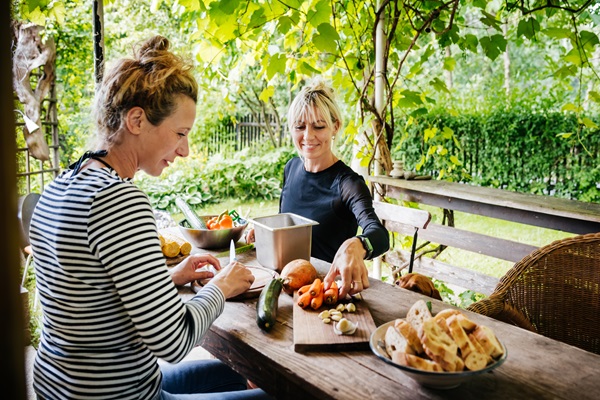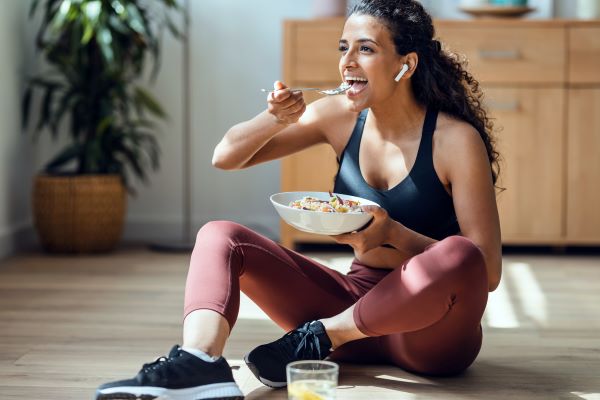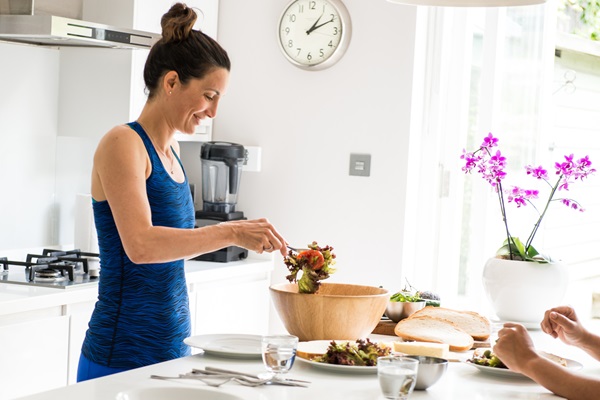-
As we move through different life stages, our nutritional needs shift. This can happen due to changes in our hormones, metabolism, and physical demands.
For women, factors like menstruation, pregnancy and menopause can have a big influence on the nutrients your body needs.
Dr Adrienne Forsyth, Associate Professor and Research Lead in Nutrition & Dietetics at Australian Catholic University, says fuelling across the lifespan isn’t static, and we should stay mindful of what we need at different ages.
Here, she shares her top tips for active women who want to adapt their nutrition through each stage of life to stay strong, healthy and energised.
Teenage girls
Adolescence is a time of rapid growth – so teen girls need to stay properly fuelled.
“The most important thing is to make sure they are getting enough energy,” says Dr Forsyth.
“It can be really hard for teenage girls, both because of messaging that they might receive externally, but also increased needs to support growth and maturation.”
This is a phase of maximum bone mineral accrual – so calcium and vitamin D are important. If you’re in this age bracket, you should aim to consume three to four serves of dairy every day – or consider calcium-fortified alternatives or speak with a GP or dietitian about supplements.
“Teenagers can be really busy – they've got school, sport, social commitments that they're juggling,” says Dr Forsyth.
“Making sure they've got snacks at hand, whether it's shelf-stable things they can keep in their locker at school, or if they've got a small cooler for when they're in the car for food on the go in between all of their activities, that can help to keep them topped up through the day.”
Focus on:
- Getting enough energy to match training and growth by eating regular meals and snacks
- Calcium (dairy foods or alternatives)
- Vitamin D
- Iron-rich foods, especially if menstruating.
Menstruation
Across the menstrual cycle, some people may experience shifts in their appetite, metabolism, fluid balance, and how the body uses carbs and fats.
“They might find that, particularly in the luteal phase, which is the latter half of the cycle, they might be a little more hungry,” says Dr Forsyth.
“They also might not be as good at using the carbohydrates that they're taking in, so having a carbohydrate-rich snack before or after exercise, for some women, might be helpful, but everyone is very unique.”
Dr Forsyth says shifts are highly individual so it’s best to listen to your own body’s cues and track them over a few cycles, to understand at what points you may feel more sluggish or inadequately fuelled.
“Then you’ll know those are the times when you might be able to top up a little bit more than you would in other parts of the cycle.”
Focus on:
- Consistent fuelling
- Listening to hunger cues
- Adjusting carbohydrate and fluid intake based on how you feel
- Iron intake is especially important if periods are heavy; have iron levels checked by your GP and consider supplements if healthy levels cannot be achieved through diet alone.
Pregnancy
When you’re pregnant, you need more energy, protein, and micronutrients, to support yourself and your baby.
“In pregnancy, it can be really hard to eat well, because there might be fatigue, so just being too tired to eat what you need; there can also be gastrointestinal symptoms, nausea, heartburn, depending on the stage of the pregnancy,” says Dr Forsyth.
To eat well, Dr Forsyth suggests having smaller, more frequent meals, and choosing foods that are rich in energy and protein.
“Having those more energy-dense foods, and even thinking about liquid options, like a smoothie, can be a great way to get in lots of nutrients and energy that you need without necessarily having to have a big plate full of food.”
Refer to your GP and health practitioners for advice, particularly around supplements, because most pregnant women find they can't meet all their nutrient needs through diet alone, says Dr Forsyth.
“Hydration and temperature regulation are also going to be particularly important here, so being mindful to consume fluids regularly and to keep cool as best as possible while you're exercising,” she adds.
Focus on:
- Eating a variety of nutrient-dense foods
- Prioritising protein, iron, folate, calcium, and iodine
- Small, frequent meals may help with nausea or fatigue
- Avoid under-eating, even if training is reduced
- Seek advice from a GP or dietitian about nutrient supplements as it can be particularly difficult to meet nutrient needs during pregnancy through food alone.
READ MORE: How to keep your iron levels up as an active womanPerimenopause and menopause
Perimenopause refers to the phase you go through in the lead up to your last period; you’re officially in menopause when you haven’t had a period in 12 months.
“In this phase, we're starting to see the opposite of adolescence, where we had bone mineral accretion; here, we're starting to experience potential bone loss and also other lean tissue, like muscle as well,” says Dr Forsyth.
It’s important to get a spread of protein throughout the day, as well as sources of calcium and Vitamin D for bone health.
Dr Forsyth says as women get older, they are at increased risk of chronic disease, may experience changes in their gastrointestinal system, and might become less able to absorb nutrients. She suggests monitoring vitamin B12 levels in particular.
“We might experience heartburn, we might have a reduced appetite and also diminished thirst cues. All of those things can perhaps lead to people not eating as much as they necessarily need,” she says.
Staying conscious of hydration is key if you want to stay active in this later life stage.
“If you don't have a lot of thirst cues, you might not necessarily feel thirsty; if you're out exercising on a warm day, you need to be mindful to still drink regularly. Have a plan that you stick to through an event or a training session.”
Focus on:
- Higher protein intake (spread across meals)
- Calcium and vitamin D for bone health
- Regular strength training to preserve lean mass
- Avoid long periods of under-fuelling, which can worsen bone loss.
Every body is unique
Keep in mind that these are just general guidelines – our individual needs vary.
Dr Forsyth recommends staying aware of how you’re feeling and monitoring your energy levels when you’re active.
“Know your own body – that's particularly important. Then, seek support from your GP and experts if you feel like you need some additional help,” she suggests.
READ MORE: Training? Here’s how to get your nutrition right or explore more women's health articles
Fuel your body at any age

Our expert: Associate Professor Adrienne Forsyth
Dr Adrienne Forsyth is an Associate Professor and Research Lead in Nutrition & Dietetics at Australian Catholic University. She is an Advanced Accredited Practising Dietitian, Advanced Accredited Sports Dietitian, and Accredited Exercise Physiologist. Adrienne partners with health and sports organisations to conduct translational research advancing nutrition for health and performance.

Put rewards on the menu
Munch, crunch or lunch your way to a reward with delicious healthy meals.
Healthy meal choices could get you closer to rewards from THE ICONIC, Apple, adidas and more with Live Better Rewards.
Eligible Medibank members with hospital and/or extras cover could earn up to $400 worth of rewards every year from our partners - THE ICONIC, adidas and more. *^
The Medibank Better Health Research Hub has partnered with and provided funding towards La Trobe University’s TRAIL W project. Find out more here: MBHRH Research Projects and Partnerships | Medibank and Trail W – HerSpor


